Minnesota Governor Tim Walz voiced disappointment with the American electorate during his first round of post-election interviews, stating that he believed Americans were “ready” for the “inclusive” Harris-Walz ticket. “It felt like at the rallies, at the things I was going to, the shops I was going in, that the momentum was going our way, and it obviously wasn’t at the end,” Walz told KSTP. “So yeah, I was a little surprised. I thought we had a positive message, and I thought the country was ready for that.”
Walz’s evaluation of the race contrasts with remarks made by several senior Harris aides, who recently acknowledged that internal polling never showed positive results for the campaign during a recent episode of the “Pod Save America” podcast.“We were behind. I mean, I think it surprised people because there were these public polls that came out in late September, early October, showing us with leads that we never saw,” senior campaign advisor David Plouffe revealed.
Walz went on to address criticism surrounding his selection as Vice President Harris’ running mate. The Minnesota governor, who gained popularity in left-wing circles after President Biden announced he would not seek re-election, emerged as a surprising choice over other contenders who might have offered an electoral advantage, such as Pennsylvania Governor Josh Shapiro. “History will write that,” Walz told KTSP when asked whether he helped or hurt the Harris ticket. “It wasn’t my decision to make. It was the vice president’s decision,” he continued. “As I said in this campaign, when you asked the question, ‘Were there things you could have done differently?’ Since we lost, the answer is obviously yes. On this one, I did the best I could.”
In a separate interview with WCCO, the governor expressed disappointment with the American electorate once again. “I think we’re going to have to understand what type of leadership do they want. We were pledging to be inclusive, we were pledging to bring people in. Donald Trump has said that that isn’t what he wants,” he said. “And so if that’s what America is leaning towards, I guess for me it’s to understand and learn more about America. Because I thought that they were going to probably move towards a more positive message.”
WATCH:
Tim Walz on his loss: Americans want a less inclusive, more negative vision
— End Wokeness (@EndWokeness) December 6, 2024
Walz’s claims about President-elect Donald Trump not being a unifier are wholly false. Trump set yet another history-making record for a GOP candidate. Not only did he win the popular vote — a historic achievement for a Republican candidate in over two decades — but he also secured over 76 million votes, making him the most successful GOP presidential candidate in history. Votes from late-counting states like Arizona and California continue to come in nearly two weeks after Election Day. As of Monday morning, Trump has garnered 76,433,589 votes, ranking second only to President Joe Biden, who received over 81 million votes in the 2020 election.
Most of Trump’s significant gains came in urban areas, although in many cases, these regions did not ultimately support him overall. His victory in all seven swing states was partly driven by strong showings in areas like Maricopa County, Arizona, which is home to Phoenix and represents more than 60% of the state’s vote. Trump saw notable success among Hispanic voters in Arizona, closing the gap he had faced in 2020 when he lost the demographic to Biden by 24 points, reducing that deficit to just 10 points against Harris, according to NBC News.
In Georgia, Trump made significant strides in the nine counties surrounding Atlanta, where Harris failed to secure large enough margins to carry the state. Counties like Fulton, DeKalb, and Gwinnett—home to more than a million nonwhite voters—saw considerable movement toward Trump. After narrowly losing Georgia in 2020, Trump improved his standing in 153 out of the state’s 159 counties this time.



